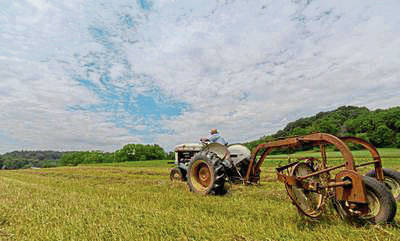Western Pa. farmers prefer free market trade to tariff-compensation handout
It’s déjà vu all over again for Pennsylvania farmers.
This time last year, farmers were contemplating a federal bailout to the tune of $12 billion to offset the negative impact of retaliatory tariffs from China.
Now the figure being floated by President Trump in his ongoing trade war with China is $15 billion.
Joel Rotz, spokesman for the Pennsylvania Farm Bureau, reiterated what he said in 2018: Farmers want trade, not aid.
“We traditionally stand opposed to anything that gets in the way of the free market. There is understanding and empathy for what the president is trying to accomplish. Farmers are trying to be patient, but their patience is wearing thin,” Rotz said.
Farmers feel like they’re caught in the middle as Trump pursues an aggressive trade policy with China, which has resulted in constricted markets and low farm prices, he said.
“They won’t turn down the aid that comes, but they certainly would rather have the market,” Rotz said, describing the tariff issue as a “punch in the gut” to farmers already suffering from poor weather, debt and declining net farm income.
Trump’s tariffs on foreign aluminum and steel prompted retaliatory tariffs from China on a range of American agricultural products, including soybeans. China was the largest purchaser of American soybeans, buying one third of all soybeans grown in the U.S. and two-thirds of those exported, according to the farm bureau.
A $12 billion aid package was greeted with a mix of gratitude and ambivalence by farmers at the time. Grain producers received a lump-sum payment once they had a yield they could report to the local Farm Service Agency, while dairy farmers received two payments — one in the fall and one earlier this spring, said Pennsylvania Farm Bureau President Rick Ebert.
The fact that another aid package is in the offing has added to the uncertainty plaguing Pennsylvania farmers, said Ebert, a third-generation dairy farmer in Derry Township.
Farmers who export their products have to find other markets, while those who don’t export are still stuck with the low prices created by overproduction, he said.
“The farmers are just concerned about where the markets are going to be. That’s where we want to get our price from — the marketplace — not through an aid program or a government payment,” Ebert said. “A government payment doesn’t make up for the losses, and it doesn’t make us whole.”
Hempfield produce farmer Joel Milowicki said the vagaries of trade wars and international markets are on the minds of a lot of area farmers, even those who don’t export their products.
“I know for a fact that a lot of farmers are talking about it,” he said. “Anybody that’s in agriculture is affected, because we still like to get a good price for our product. … I think it affects all farmers to some degree.”
Milowicki, 35, has overseen the transition of Keenan’s Greenhill Farms from a dairy operation to a produce and beef farm. Most of its products are sold at JP’s Farmers Market in Mt. Pleasant Township near Armbrust.
The farm already was transitioning away from dairy, which had become unprofitable, when two tornadoes struck in 2018. In addition to a wide variety of fruits and vegetables, the farm raises 100 Black Angus beef cows.
Milowicki said depressed prices can’t be blamed only on the impact of tariffs — they’re also the result of overproduction and oversupply.
“The American farmer is his own worst enemy, because they’re always trying to produce more,” he said. “When they overproduce a commodity that stores well, it’s really hard to keep the price up.”
Remove the ads from your TribLIVE reading experience but still support the journalists who create the content with TribLIVE Ad-Free.

